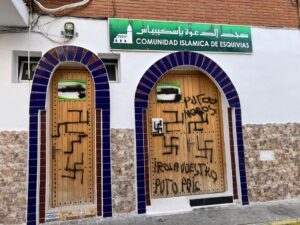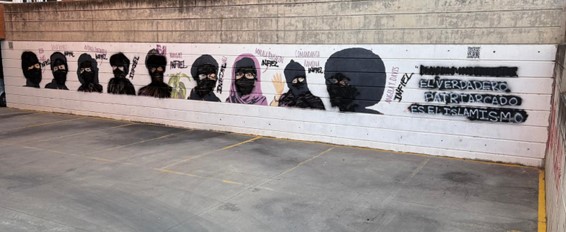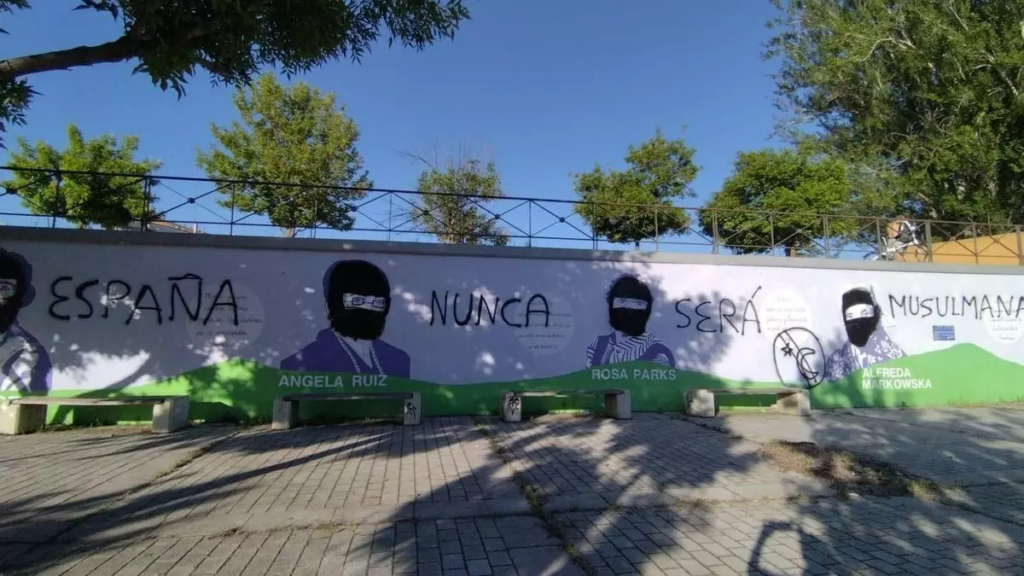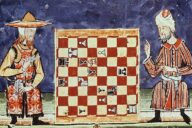In recent months, we have witnessed an increase in acts of vandalism that are part of a disturbing phenomenon throughout Europe, and especially in Spain: the growth of Islamophobia as a political and social tool used by ultraconservative sectors. This is a coordinated strategy that exploits fear of Islam in Western contexts to undermine perceptions of social progress, such as the defence of human rights and cultural diversity, as well as feminism, which is a direct target of offensive graffiti.
Rise of Islamophobia as a political and social strategy
This alarming trend includes Islamophobic rhetoric that comes in two forms: one that’s clearly xenophobic, with messages like ‘Spain will never be Muslim.’ These kinds of slogans reinforce the idea that Islam is foreign to Spain and, as a reaction, there’s a search for the idea of a closed, homogeneous, and exclusive nation, which is incompatible with the constitutional values of equality, plurality, and religious freedom. For Muslim citizens who are part of the millions of people who make up the fabric of Spanish society, this is a direct threat to their place in society, as they are denied the right to exist.
This type of slogan reinforces the idea that Islam is a foreign entity in Spain and, as a reaction, there is a search for a closed, homogeneous, and exclusive nation.
On the other hand, there is another version of Islamophobia disguised as a supposed concern for equality, women’s freedom, or public safety. Messages such as ‚infidel’ alongside the face of a woman who has been vandalised by covering her in black to emulate a veil, or ‘true patriarchy is Islamism’, represent a perversion of language that seeks to delegitimise Islam and, by extension, its entire community, by portraying it as a culture incompatible with democratic and progressive values. Such slogans point to the supposed patriarchal nature of Islam, even though, paradoxically, these attacks often come from sectors that have historically opposed feminism and even reject the social movement for women’s rights in their programmes, considering it a degeneration of gender ideology.
The use of the veil or any other symbol related to Islamic culture is exploited in these acts of vandalism to justify hate speech. The projection of supposed Islamisation promotes the view that women will be subjugated, assigning them a passive role in their life experience. Furthermore, this serves to silence the voices of Muslim women themselves, who are seen merely as victims who need to be ‘saved’ by the Western world, rather than as active individuals with the right to decide on their beliefs, their way of life, and their bodies, like all women. All in all, the choice of feminist demonstrations as the target of these attacks cannot fail to be seen, in general terms, as an act of hatred towards the emancipation of women.
The voices of Muslim women are silenced, seen as victims who need to be ‘saved’ through a Western lens, rather than active individuals with the right to decide on their beliefs, their lives, and their bodies.
This phenomenon is fuelled by misinformation and the spread of hoaxes about religious impositions, myths about the Islamisation of Europe, and exaggerations about the supposed threat posed by Muslim communities. These stereotypes of fear legitimise a rejection that not only distances us through ignorance, but also divides us as a society. It is therefore necessary to emphasise that Islamophobia is not only a form of religious intolerance, but also a tool that seeks to divide society and weaken community ties.
Need for an active and inclusive social response

Vandalism graffiti at a cultural and religious centre belonging to the Islamic Community of Esquivias © Ayto. de Esquivias.
By focusing on an ‘internal enemy,’ the possibility of addressing real structural problems from a social perspective is undermined: inequality, precariousness, gender-based violence, the decline of rights, and the rise of authoritarian ideologies. In light of this situation, silence and indifference have no place. It is now urgent to counter narratives of hatred with accurate information and to promote spaces for intercultural dialogue, with actions aimed at inclusion and plurality.
In this context, it is essential to emphasise the importance of multicultural coexistence, based on mutual respect and the recognition of diversity as an essential value. Culturally diverse societies are not only a reality in our daily lives, but also an opportunity to enrich our social fabric through exchange, mutual understanding, and cooperation. Guaranteeing the rights of the population is never exclusive; it allows us to protect and guarantee the integrity of individuals, bringing us together socially. Defending the rights of the Muslim community and women in this type of oppression means committing to the democratic principles that sustain us.
Julia Martínez Cano y Ainara García Sánchez
















No Comments